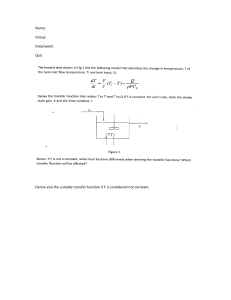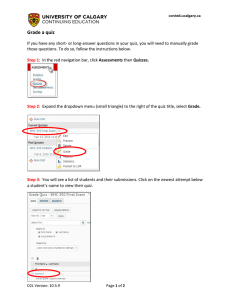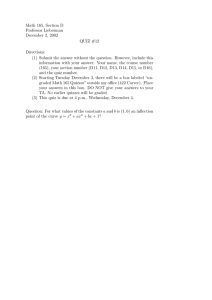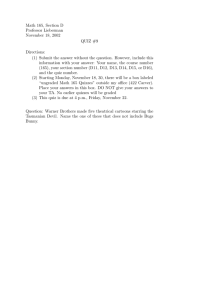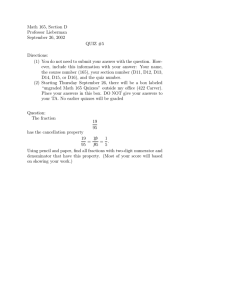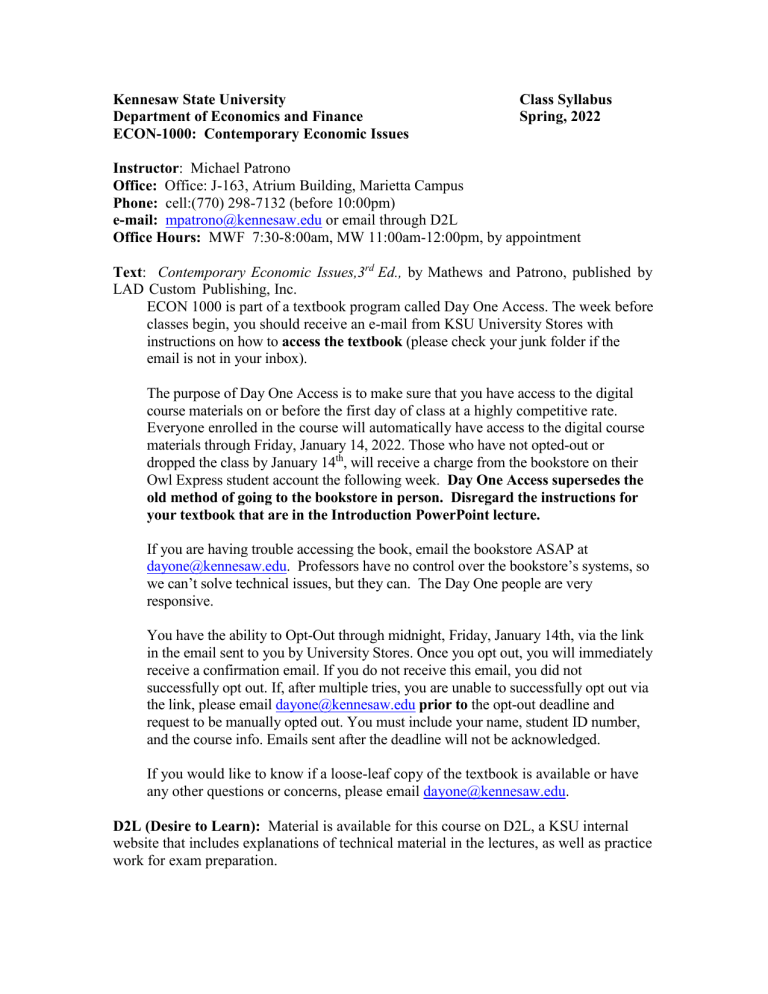
Kennesaw State University Department of Economics and Finance ECON-1000: Contemporary Economic Issues Class Syllabus Spring, 2022 Instructor: Michael Patrono Office: Office: J-163, Atrium Building, Marietta Campus Phone: cell:(770) 298-7132 (before 10:00pm) e-mail: mpatrono@kennesaw.edu or email through D2L Office Hours: MWF 7:30-8:00am, MW 11:00am-12:00pm, by appointment Text: Contemporary Economic Issues,3rd Ed., by Mathews and Patrono, published by LAD Custom Publishing, Inc. ECON 1000 is part of a textbook program called Day One Access. The week before classes begin, you should receive an e-mail from KSU University Stores with instructions on how to access the textbook (please check your junk folder if the email is not in your inbox). The purpose of Day One Access is to make sure that you have access to the digital course materials on or before the first day of class at a highly competitive rate. Everyone enrolled in the course will automatically have access to the digital course materials through Friday, January 14, 2022. Those who have not opted-out or dropped the class by January 14th, will receive a charge from the bookstore on their Owl Express student account the following week. Day One Access supersedes the old method of going to the bookstore in person. Disregard the instructions for your textbook that are in the Introduction PowerPoint lecture. If you are having trouble accessing the book, email the bookstore ASAP at dayone@kennesaw.edu. Professors have no control over the bookstore’s systems, so we can’t solve technical issues, but they can. The Day One people are very responsive. You have the ability to Opt-Out through midnight, Friday, January 14th, via the link in the email sent to you by University Stores. Once you opt out, you will immediately receive a confirmation email. If you do not receive this email, you did not successfully opt out. If, after multiple tries, you are unable to successfully opt out via the link, please email dayone@kennesaw.edu prior to the opt-out deadline and request to be manually opted out. You must include your name, student ID number, and the course info. Emails sent after the deadline will not be acknowledged. If you would like to know if a loose-leaf copy of the textbook is available or have any other questions or concerns, please email dayone@kennesaw.edu. D2L (Desire to Learn): Material is available for this course on D2L, a KSU internal website that includes explanations of technical material in the lectures, as well as practice work for exam preparation. Computer Related Problems: The student help desk number is 470-578-3555. If you are having any kind of computer problem these are the people to contact. They are very knowledgeable and helpful. Course Description: Analysis of economic decision-making in a global setting. Examines the fundamental questions of economics as they relate to individuals, firms, and governments operating in a global economy. Topics covered include: a comparison of economic systems, how a market system works, the role of government in the economy, the basis for international trade, the dynamics o f the global monetary system, and the impact of technology on economic growth. Course Prerequisites: ENGL0099, MATH0099, and READ0099, if required. Course Objective: The purpose of this course is to expose non-business majors to the basic elements of economics in a global setting. Topics include the basic workings of free markets, the role of the government in the economy, the basis for international trade, national income determination, production and growth, the monetary system, etc. In addition we will explore issues in the ethics of profit making, competition, and income distribution. The emphasis will be on genuine understanding of the material, not on “memorization”. Course Withdrawal Date and Policy: Last day to withdraw without academic penalty is Tuesday, March 15th, 2022. Students withdrawing after this date will receive a WF if failing. Students who wish to withdraw with a grade of “W” must do so formally through the Registrar’s Office on or before this date. Teaching Methodology: We are a face-to-face class with lectures and exams delivered in our assigned classroom. Only quizzes will be done online. Attendance Policy: Classroom attendance is recommended, but not required. If you feel the least bit sick, don’t come. All material is available online in D2L. All material needed to do well in class will be posted on D2L. Grading: Your grade in this class will come from a combination of quizzes, exams, and optional extra credit assignments. Quizzes: You are required to complete 10 out of 11 total quizzes, one for each chapter covered in the course plus the introductory quiz. The combined value of these quizzes is 20% of your total course grade. Your lowest quiz score will be automatically dropped. This is to make room in your schedule to absorb personal scheduling conflicts with work, illness, or vacation. Do not ask for make-up quizzes if you miss one. The drop policy will be used for the missed quizzes. The purpose of the quizzes is twofold; first, they pace your studying and, second, they give you practice on problem types that will be encountered on the exams. Grades for each quiz will automatically be posted under “Grades” in D2L. Make sure to check your grade to see if it published. If it didn’t please contact me ASAP to solve the problem. The first and successive quizzes will be announced via D2L Calendar. Late or missed assignments will not be accepted or made up. If you miss a quiz, you must use your drop to cover it. Each quiz will be administered through the Quizzes tab on D2L and will consist of multiple-choice questions. I have three very strong recommendations for you regarding the quizzes: 1. Read the chapter and watch the PowerPoints BEFORE attempting a quiz. This way you will have some idea where to look in the text to find your answer. 2. Take the practice quiz for each chapter when appropriate. There is a practice quiz located at the end of each book chapter. Use the questions to guide your studying, but do not try to memorize the correct answers since I will change the questions. Also, work on the study guides posted on D2L. Do not wait until the last minute to study for a quiz. 3. Work out, in your own words, the answers to the study guides (see the content browser on the homepage). If you do so, the multiple choice questions will be a snap! Exams: There will be two tests during the semester plus the final exam, for a total of 3 exams. The final exam is not cumulative. I will automatically drop the lowest of the first two exam grades, but no one can drop the final exam no matter how well they are doing in class up to that point. Just as with the drop policy for quizzes, any missed exam will not be made up unless there is an emergency or excused absence. The professor reserves the right to determine what constitutes an emergency, but would normally include military orders, hospital admissions, KSU required travel, etc. Personal issues such as work, the flu, car trouble, lack of a baby sitter, etc. are personal in nature and don’t qualify as an emergency for exam purposes. If you miss an exam without the above exceptions your exam will receive a zero score (which can then be dropped if you have not exceeded the number of permitted drops). If at all possible contact me in advance of an exam if you will be unavoidably absent and are asking for a makeup exam. The exams will include both material discussed in class and information contained in the assigned readings and PowerPoint Lectures. Each test/exam will be administered in person in class and will consist of multiple-choice questions. Make sure to check the schedule listed in our syllabus. It is a good idea to put an alert in your phone’s calendar to remind yourself of due dates. Both individual test and quiz grades, as well as your overall grade will be rounded to the nearest whole number (i.e. 79.33 will be rounded to 79 and 79.67 will be rounded to 80). (See “Class Grade” below.) Extra Credit: There are several possible extra credit opportunities for this class. 1) You can submit up to two essays based on articles that I have placed in the Assignments Tab on the D2L Homepage. 2) You can attend lectures sponsored by the Bagwell Center. See the Content Browser in D2L for details. Each essay can earn up to 3 points each. Each guest lecture earns 3 points each. You can earn a total of 6 points of extra credit that will be added to the final exam score since that score will not be dropped. All extra credit opportunities have hard deadlines, so check them out soon. You cannot ask to do them at the end of the semester after you find out that you are not doing well. The extra credit is available for conscientious students attempting to maximize their score. The extra credit is not required. Incomplete Grades: Incompletes are awarded for non-academic reasons at the instructor’s discretion. Grade Calculation Rubric Weight Average of Quiz Grades (with the lowest grade dropped) 20% Midterm Exam (with lowest one dropped) 40% Final Exam 40% Total Plus Optional Extra Credits Formula for Calculating Class Grade Class Grade = (Avg. of Quizzes x .2)+(Midterm x .4)+((Final + Extra Credit) x .4) 90+ = A, 80-89 = B, 70-79 = C, 60-69 = D, 59 or less = F. Normal rounding procedures will be followed for your score. 100% Up to 6 pts added to Final Exam score Abbreviated Course Schedule With Due Dates: Week Date Item 1 Monday, January 10 First Day of class: Review syllabus and start Chapter 1 1 Saturday, January 15 Intro Quiz on Introduction due by midnight on Saturday. You can start and complete it at any time Monday to Saturday. See the Quizzes tab in D2L for details 1 Sunday, January .Chapter 1 Quiz due: See the Quizzes tab in D2L for 16 details 2 Monday, January 17 3 Tuesday, January 25 Chapter 2 Quiz due 4 Tuesday, February 1 Chapter 3 Quiz due 4 Wednesday, February 2 Exam 1 on Chapters 1, 2, and 3 in class. Martin Luther King, Jr. Holiday. No classes held at KSU. Extra Credit Essay #1 opens in Assignments Tab on Homepage 5 Sunday, February 13 6 Sunday, February 20 7 Sunday, Chapter 4 Quiz due. Chapter 6 Quiz due. We are skipping chapter 5 Extra Credit Essay #1 due at midnight February 27 Chapter 7 Quiz due. 7 Monday, February 28 Extra Credit Essay #2 opens in Assignments Tab 7 Thursday, March 3 8 Friday, March 4 NA Monday, March 7-Sunday March 13 9 Sunday, March 20 Chapter 8 Quiz due. Exam 2 on Chapters 4, 6, 7, and 8 in class. Spring Break! Chapter 10 Quiz due. We are skipping chapter 9 Extra Credit Essay #2 due at midnight 9 Sunday, March 27 10 Sunday, April 3 NA Monday, April 4 Chapter 11 Quiz due at midnight. Chapter 12 Quiz due. Final Exam on Chapters 10, 11, and 12 due at midnight. Note: The course outline is tentative and can be changed by the Instructor when needed. Changes will be announced in class. It is the responsibility of the student to stay aware of any changes during the semester. Lecture Schedule: (Exam and Quiz Schedule above) Week 1. January 10-12-14 Foundations of Economics Lectures: Discussion of economic concepts such as scarcity, resources, property rights, contract, etc. We will discuss the basis of the Free Market Capitalist System and compare and contrast it with Socialist/Communist and Mixed economic systems. Required Reading: Chapter 1in Contemporary Economic Issues Week 2. January 19-21 No Class on Monday, January 17th due to Martin Luther King, Jr. Holiday Fundamental Economic Questions and Gains from Specialization Lectures: Discussion of the problem of societies having to make decisions under the constraints imposed by scarcity. The concept of the Production Possibilities Frontier is explained to help understand tradeoffs in production. Concepts of productive efficiency are explained. Required Reading: Chapter 2 in Contemporary Economic Issues Week 3. January 24-26-28 Finish Ch. 2 and begin: Economic Systems: Capitalism vs Socialism Lectures: Discussion of economic concepts such as property rights, contract, etc. We will discuss the basis of the Free Market Capitalist System and compare and contrast it with Socialist/Communist and Mixed economic systems. Required Reading: Chapter 3 in Contemporary Economic Issues Week 4: January 31-February 2-4 Finish Ch. 3 and begin: Organizing Principles of Capitalist Systems Lectures: The theory of Supply and Demand will be explained. The efficiency and selfcorrecting mechanisms of the economy will be discussed. Required Reading: Chapter 4 in Contemporary Economic Issues Week 5: February 7-9-11 Organizing Principles of Capitalist Systems (cont.) Lectures: The theory of Supply and Demand will be explained. The efficiency and selfcorrecting mechanisms of the economy will be discussed. Required Reading: Chapter 4 in Contemporary Economic Issues Week 6: February 14-16-18 Organizing Principles of Socialist Systems Lectures: The theory of how a centrally planned socialist system functions is explained through universal principles as well as by examining the historical experience of the former Soviet Union. Required Reading: Chapter 6 in Contemporary Economic Issues Week 7: February 21-23-25 Gross Domestic Product and Economic Growth Lectures: The concept of the Gross Domestic Product and its connection to the nation’s income will be examined. The difference between Real GDP and Nominal GDP will be highlighted. The mechanism of inflation will be examined. Required Reading: Chapter 7 in Contemporary Economic Issues Week 8: February 28-March 2-4 Impact of Policy Decisions on the Rate of Inflation Lectures: Discussion of the impact of the money supply on the rate of inflation. The role of the Federal Reserve is examined in this context, and it role in smoothing the business cycle is examined. Required Reading: Chapter 8 in Contemporary Economic Issues Week 9: March 14-16-18 Market Failure Lectures: Discussion of the factors which cause market based systems to fail to achieve perfect economic efficiency. This chapter lays out an intellectually coherent explanation of the criticisms of the capitalist system from within the capitalist system. Required Readings: Chapter 10 in Contemporary Economic Issues Week 10: March 21-23-25 Government Failure Lectures: Discussion of the factors that prevent government intervention in capitalist societies from achieving economic efficiency. This chapter lays out the intellectually coherent explanation of the criticisms of government intervention in a capitalist system. Required Readings: Chapter 11 in Contemporary Economic Issues Week 11: March 28-30-April 1 Inequality and Redistribution Lectures: Discussion of the degree of income inequality in our society and its measurement. The distinction between inequality and poverty is examined, and the measurement of poverty is explained. Arguments for and against coercive redistribution are examined. Required Readings: Chapter 12 in Contemporary Economic Issues April 4: Final Exam Note: This is a tentative course outline, and it is subject to change when necessary. It is the responsibility of students to stay aware of changes that may occur during the semester. All changes to the schedule, if any, will be posted in D2L. Academic Honesty: KSU students are responsible for upholding the provisions of the Student Code of Conduct, as published in the Undergraduate and Graduate Catalogs. Section II of the Code addresses the University’s policies and procedures on Academic Honesty, including provisions regarding plagiarism and cheating, unauthorized access to University materials, misrepresentation and/or falsification of University records or academic work, malicious removal, retention, or destruction of library materials, malicious/intentional misuse of computer facilities and/or services, and misuse of student ID cards. Incidents of violations of the Student Code of Conduct will be handled through the University’s Judiciary Program. Disciplinary measures in case of such incidents include expulsion, suspension, probated suspension, probation, restrictions, reprimand (oral or written), restitution, and community service. Disruptive Behavior: Belligerent, abusive, profane, threatening and/or inappropriate behavior on the part of students is in violation of the KSU Student Code of Conduct. According to University Policy regarding disruptive behavior, students who are found in violation of the Code of Conduct may be subject to immediate dismissal from the University. Also, those violations that may constitute misdemeanor or felony violations of state or federal law may also be subject to criminal action beyond the University disciplinary process.
